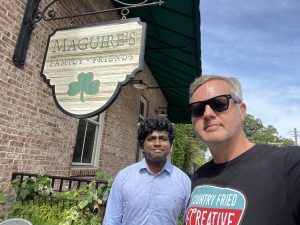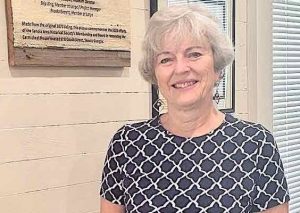It is a crime so often hidden from view, one that the world largely ignores. It is stated on occasion in terms of human trafficking, but it’s real name is slavery and it directly affects the lives of untold millions. And it was the desire to bring the reality of slavery to light, and to work to end it, that led six women affiliated with Operation Mobilization in Tyrone to the make the “Freedom Climb” up Mount Kilimanjaro in east Africa earlier this month.
The numbers involving the worldwide reality of slavery in the 21st century are understandably difficult to estimate since it is a crime, and one that operates with stealth to avoid the light of scrutiny. But nearly every human rights organizations agrees that slavery is more prevalent today than at any time in recorded history. The estimated numbers worldwide range up to 27 million people.
And that is where a handful of women affiliated with Operation Mobilization in January joined more than 40 others from around the world to travel to Tanzania and climb Mount Kilimanjaro in an effort to raise funds to fight slavery and raise awareness so that others might become involved in that fight.
Making the climb were Nancy Byrne, Susan McCabe, Sharon Scott and Susan Woods. And serving at the base camp site as prayer intercessors were Marj Garrean and Sheila Slocum.
For Garrean, McCabe and the others, the idea, the intent, the reality and the arduous nature of the climb served as a metaphor for the difficult, dangerous and incremental climb out of slavery. It is a fight, Slocum noted, one that must be engaged one step at a time to end this horrific crime.
Byrne before making the trip to Africa said, “Whether we make it or not, it is a symbolic journey of embracing the struggle and the opportunity to identify with those who suffer. As I climb, it will be a moment-by-moment reminder to pray, to come alongside and feel deeply the sufferings of those who struggle daily to climb out to gain their freedom.”
Woods, too, prior to the climb expressed excitement at the idea of participating in the climb and the solemn nature of what the climb represents.
“I saw an ad for the climb,” said Woods. “I was excited about it but I didn’t know if God was inviting me. But God confirmed it in many ways so I’m going forward with confidence that He will give me the strength and health. The calling is to bring awareness and raise funds that will help bring hope to the women and children living in the circumstances of slavery, child labor and trafficking.”
It turns out that God gave each of the women the strength to take a stand to end slavery. And when it comes to Kilimanjaro, the climb is a far cry from a walk in the park.
Located on northeast Tanzania, Kilimanjaro is the highest mountain in Africa and sits 19,341 feet above sea level. McCabe and Scott climbed to the Gilman’s Point summit while Byrne and McCabe continued on to the top, arriving at Uhuru Peak. The significance of the name of that peak was realized in the climb itself since the word Uhuru is Swahili for “freedom.”
In all there were a total of 48 women from nine countries participating in the climb. Twenty-three of those made it to the top and 91 percent reached at least the first summit. That number compares to the 75 percent of all climbers in a given year that make at least one summit, Byrne explained.
“It’s a miracle how God strengthened us,” said Scott of the effort.
“Many people wanted to know what we ate or what we were doing to accomplish it,” Byrne joined in. “It’s a testimony to God.”
Back at base camp the intercessors prayed 24/7 for the climbers as a group and personally for each climber, Garrean said.
Kilimanjaro is indeed 19,341 feet in height, but the climb to the top included a course that totaled 20 miles each way.
Yet, their own personal efforts notwithstanding, the women were quick to give the credit for their success to the female porters traveling with them.
“We would pray for the porters and wash their feet to honor them, to show respect and bless them,” said Woods.
In fact it was prayer that played a very large role during the entire climb period that included four and a half days up and a day and a half back. And so many of the prayers centered on those who were the reason for the climb, the many millions of women and children all over the world living out their lives in slavery. Those prayers continue today.
“We all came off the mountain wanting not to live ordinary lives but to live dangerously, to continue to bring awareness to slavery,” McCabe said, then expanding that view to the women and children in the Atlanta area who must live in a sheltered environment as a result of the abuse they suffered.
Slocum, too, said her life was affected by the trip to Africa’s highest mountain.
“I gained ground at Kilimanjaro. I don’t want to lose it and I’m praying for direction,” Slocum said of her desire to take the lesson learned on the mountain into a greater focus.
Scott agreed, saying she hoped that Operation Mobilization can help prevent women and children from getting to the point of living a life in slavery.
“I want to be a voice for these women and part of an organization that wants to end slavery,” Scott added.
Someone once said that it is easy to sit up and take notice, but it’s much more difficult to get up and take action. This small group of women got up and took action. And considering the impact it made on them it would not be surprising to see that action extend beyond the base of a mountain whose highest summit is called “freedom.”
Those interested in finding out more about the Freedom Climb can visit www.thefreedomclimb.net











Leave a Comment
You must be logged in to post a comment.